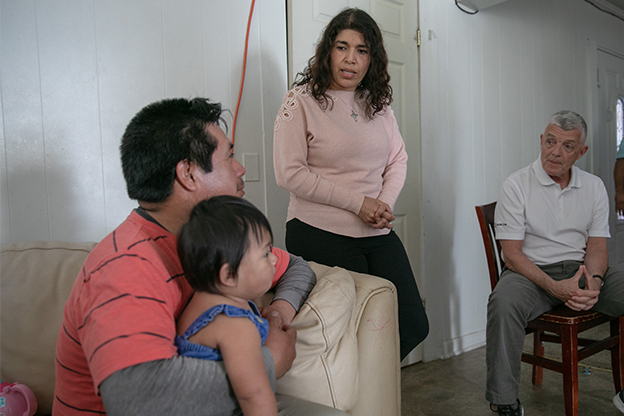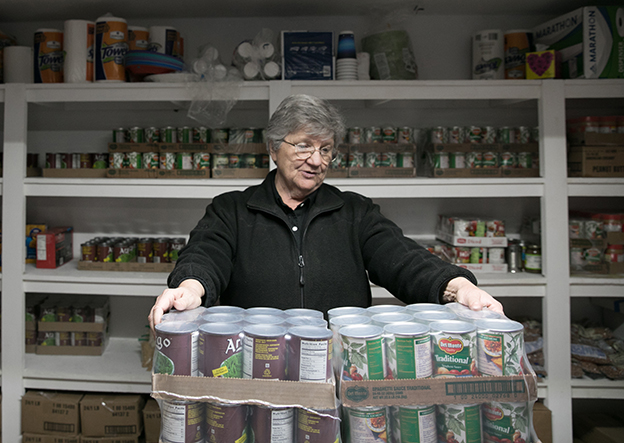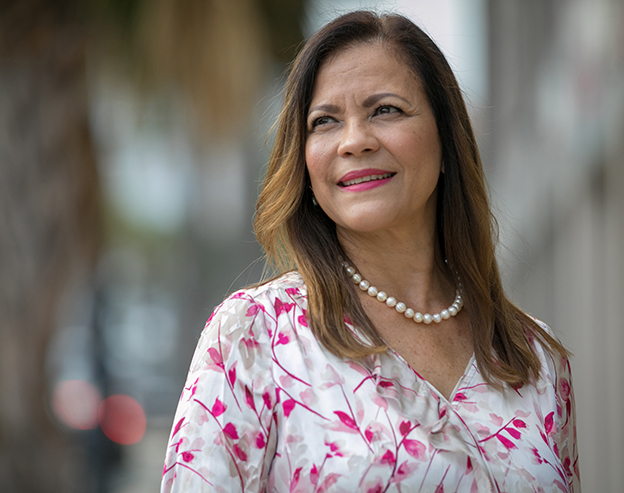One of the realities I witness in mission dioceses is an agility in responding to the needs of communities as they develop and change. With limited resources, people who serve in under resourced areas of the country must adapt their ministries in order to reach people on the margins.
During this women’s history month, it is good to remember how frequently the agile, “on the ground” ministry of the Church is undertaken by both women religious and, increasingly, lay women.
Several examples from recent travels come to mind. One comes from Dothan, Mississippi, where I visited with priests from the Archdiocese of Boson on a mission immersion trip. We learned the fascinating story of St. Columba Church, a community that has roots that stretch back over a century and to which Catholic Extension Society gave its first grant in 1914. In recent years, though, there has been a growing Hispanic presence, with families moving into the region to work in farming. The current pastoral associate is Missionary Servant of the Most Blessed Trinity Sister Miriam Fiduccia, who told us the story of her predecessor, Sr. Mary Kay. Some years ago, Sr. Mary observed that the Hispanic presence in Dothan was growing, but she did not see them represented in the parish. So she took it upon herself to learn where they lived, mindful that very many Hispanics are Catholic. When she saw a chicken tractor in a nearby farming area, she followed it to learn where the poultry workers lived. She discovered a community of some 1,000 people, and began inviting them to take part in the parish community.

Another woman who works at St. Columba, Leticia Gordillo, knew that many of the workers felt isolated from the wider community. She began knocking on doors during the 46 days before the Feast of Our Lady of Guadalupe, inviting them to pray the rosary with her. (The 46 day rosary is a devotion known to many Mexicans and Guatemalans, calling to mind the 46 stars on the Virgin’s cape.) Over those several weeks, she met some 500 people, and eventually they began to integrate into parish life. Today St. Columba is a vibrant community which includes both Spanish-speaking and English-speaking parishioners.
Another example is Dominican Sr. Monica Dubois, who leads the Saint Anne Mission in Klagetoh, Arizona. Like her predecessor, Sr. Maria Sarto, who was given Catholic Extension Society’s Lumen Christi Award in 1996, Sr. Monica works closely with the Navajo community that surrounds the mission. Catholic Extension Society supports Sr. Monica’s salary in this remote area, accessible only by an unpaved road that gets muddy in the rainy season. But she maintains that the mission represents the presence of the Catholic Church to anybody who needs assistance.

She helps run a food bank and a thrift store, and arranges for Mass in the chapel. Reflecting on her pastoral role, she observes that Jesus calls his Church to be present to all nations. The Navajos she works with say that the Catholic Church and Navajo ways go hand and hand, so she finds among them a willingness to see St. Anne as a place where they can practice their spirituality in ways consistent with what they have learned from their elders. Sr. Monica’s leadership is a catalyst in this region where many live in poor, remote areas.
A final example is that of Sandra Rodriguez, the Archbishop’s Delegate for Economic Affairs in the Archdiocese of San Juan, Puerto Rico, whose job is to discern the wise stewardship of money. Catholic Extension Society has worked with Sandra during the Archdiocese’s having to navigate the intricacies of hurricane relief, so that it can continue its five centuries of service to the people of Puerto Rico.

The Church, she says, is fundamentally about charity and love, but like any organization it must find funds that will help it promote its mission. Sandra sees her job as first about carefully managing money, but second about helping people to understand how the Church’s ministries can happen only if there are ordinary men and women willing to fund them. As a lay person, Sandra speaks to peers when she explains the relationship between the parish and the Archdiocese, and so can bring a realist voice to conversations about money. Her quiet leadership is making possible many ministries serving the poor of San Juan.
Throughout the dioceses served by Catholic Extension Society, we see many reminders of the invaluable leadership of women. Saints like Katharine Drexel, who founded missions and schools to black and Indian Catholics, and Elizabeth Ann Seton, who founded the Catholic school system in the United States, tell of a long history of women’s leadership. And today, people like Sr. Mary Kay, Sr. Miriam Fiduccia, Leticia Gordillo, Sr. Monica Dubois, and Sandra Rodriguez, and many other women, demonstrate the vital role that women play in reaching out to people on the margins of society.


